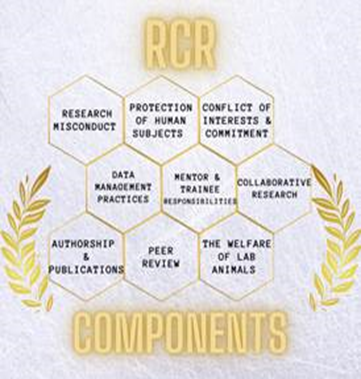Responsible Conduct of Research
The Responsible Conduct of Research (RCR) Unit under the NHG Health Office of Human Subject Research Protection Program (OHRPP) aims to equip our researchers with the knowledge of best practices in research to guide them in making the right decisions. This would be especially applicable in instances that challenge individual values and integrity.
RCR looks at upholding the professionalism of research and the integrity of research, which is the operative principle. Although research regulations and guidelines abound, there still exists instances whereby there are no clear-cut answers. At times like these, individual values and integrity may be challenged, and the onus falls upon the researcher to determine what is right.
RCR encourages researchers to:
-
Honestly report research findings/ information truthfully while honoring commitments.
-
Accurately and thoroughly report research data and take caution to avoid errors.
-
Utilize resources effectively and avoid wastage.
-
Objectively allow the facts to present itself.
-
Abide to the laws and standards set by individual’s profession, discipline, institutions and relevant laws.

Components of Responsible Conduct of Research
Responsible Conduct of Research is made up of the following components.

The components of RCR are summarized as follows.
1. Research Misconduct
(A) RCR Research Misconduct Event(s) is defined as Falsification, Fabrication or Plagiarism in proposing, performing, or reviewing research, or in reporting research results.
(B) A RCR Event may refer research misconduct events as defined above or any other RCR Event(s) that may be categorized under one of the components listed above.
What to do if there is suspected Research Misconduct?
NHG Health OHRPP recommends that the Whistle-Blower (the individual reporting the suspected research misconduct) adheres to his/her institution’s policies and or guidelines for whistle-blowing if there is suspected research misconduct.
Download the RCR Event/ RCR Research Misconduct Event Report Form for Institution here.
2. Protection of Human Subjects
Researchers have the responsibility of obtaining appropriate approval before conducting research involving human subjects.
3. Conflicts of Interests (COI) & Commitment
Researchers should recognize the Conflicts of Interest that are crucial and that there are required steps to be taken to ensure that they do not interfere with the responsible practice of research.
4. Data Management Practices
Researchers should be familiar with the important considerations for data management.
5. Mentor and Trainee Responsibilities
Researchers should understand the basic responsibilities of mentor-trainee relationship so as to ultimately produce independent and responsible researchers.
6. Collaborative Research
Researchers should appreciate that effective collaboration begins with a clear understanding of roles and relationships, good collaboration requires effective management plans and appreciate that different institutions may have different research practices.
7. Authorship and Publication
Researchers should appreciate the minimum standards of responsible publications, understand the elements of a responsible publication, appreciate what contributes to responsible authorship and be aware of practices to avoid.
8. Peer Review
Researchers should understand the qualities of responsible peer review, the importance of meeting deadlines for review, the importance of assessing quality of the research paper, appreciate the role of the reviewer to judge the importance of the research and understand the importance of preserving confidentiality.
9. The Welfare of Lab Animals
Researchers intending to use animals in their research should know what activities are subject to regulation(s), understand and follow the rules for research approval, obtain appropriate training and accept continuing responsibility for compliance through all stages of the research.
Responsible Conduct of Research Manual
Responsible Conduct of Research (RCR) is and can be learned in multifarious ways and standards for RCR may vary from department to department and possibly institution to institution. In numerous instances, more than one response to a RCR situation may be considered acceptable research practice.
The NHG Health-RCR Manual will describe the core components of RCR (along with recommended guides to carry out research responsibly).
-
Download the Responsible Conduct of Research Manual here.
CITI Modules on Responsible Conduct of Research
CITI modules on RCR seek to educate researchers and research staff on the responsible conduct of research in fields such as Biomedical Sciences, Research Administration and Social, Behavioral & Education Sciences through thinking questions.
-
Learn more about the CITI Training Programme and its RCR modules here.

